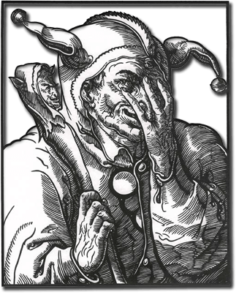The journalist is always the best friend of those in power and of the cops. S/he is the one who smooths the path for them, who conceals their violence, always ready to justify it, who publicizes their misdeeds and applauds them or who criticizes them so that next time they can strike better.
It is thanks to journalists that we have become so weak, frightened and divided as to not be able to react to the daily repression and the suffocating control of our existence. The television news is defining everyone who rebels – against the war, against exploitation, against increasingly precarious and vile living conditions – a terrorist, an individual dangerous for all. It is from the pages of newspapers that the rage of the exploited is thrust into the treacherous arms of the parties and unions, that have managed our exploitation up until yesterday, and today would like to manage our protest.
Journalists are the enemies of anyone who is exploited and no longer wants to be so, of anyone who is a slave and wants to free themselves, of anyone who is without strength and wants to take a breath.
Of the rhetoric about “freedom of information”, of the myth of the free and independent reporter that exposes the powerful with his pen and denounces their misdeeds, nothing is left but empty words. The journalist is simply a functionary, the central gear around which the information machine turns. Their close collaboration with the police headquarters, their inevitable dependence on all the groups in power, in fact, sets them against all those who are not in power. Even if one were to open some space for truth in a newspaper, one would drown in the sea of banality and lies that it contains. Absurdity of absurdities, it would be like trying to express some rebellious thought on call-in radio.
An information grinding machine, built to create consensus and to maintain the social peace, it manipulates our greatest weaknesses and our worst fears.
The press incarnates for its readers the realization of a hope: that there are those who foresee and everything follows the straight path. It is at the same time information and judgment. It is also a tool against boredom, capable of consoling even if it doesn’t manage to gather anything intelligible from the surrounding world. The desire that many readers have of a clean, ordered world in which one feels at ease – that is what is sought and found on the pages of the newspapers – it also contains within itself the anxiety about this world, considered incomprehensible without the help of others.
Thanks to its authority, the newspaper relieves the reader of the necessity of arranging, sifting and valuing events, Furnishing the reader with accounts of what has happened that have already been ordered and commented on in a synthetic and safe way, the press gives the consoling certainty that one is still in a position to confront and understand reality, in order to feel like part of this world.
Even the reports dedicated to “true stories”, to little daily incidents, take on a meaning; they give the readers the feeling that they are speaking of the people, of human fate, of the problems of men and women exactly like each one of them. And one can calmly rely on a newspaper that shows so much interest in the human side. The press appears to be a good companion, that is always there when it is needed, managing to hide the considerable power of persuasion available to it. What stands out is always the question/demand from the readers for tools useful for understanding the society in which they live, that necessarily becomes increasingly abstract, leading events back to the individual and their fate, joined with the desire to conserve objects of identification and projection on which to be able to finally unload personal worries and problems.
This is an intimately deep mechanism that creates public opinion, that influences, that furnishes the everyday discussions of millions of people. The newspapers build their power on this, closely intertwined with the interests of power.
– Caught in the Web of Deception – Anarchists and the Media
———
Source: 325
